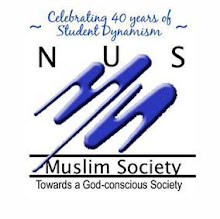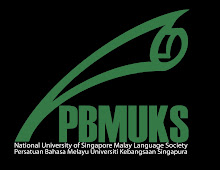Muslim Youth Intelligentsia Series 2008
The Role of Freewill in the Grand design of the Creator
The
The discussion revealed that Singaporean Youth held on to various beliefs. There is the school of thought that opined that indeed - "freewill" does exist”. Eloquently articulated a participant stated that Islam affirms Man’s status as a free agent. For instance, the verse - "We will not change the state of a people until they change that which is in themselves" Quran
However, at the other of the spectrum, others thought that a thorough deconstruction of the condition of being “free” is a legitimate enquiry. This is necessary step before being able to determine how free Man really is, if s/he at all is. Some participants noted that choices made are governed by various factors. These factors include Allah’s will at the forefront, but there were more factors to take into consideration, such as neurology, cultural background, belief systems, personal experience, and limited knowledge / rational faculty. Considering the numerous factors that constraints Man’s independent decision-making process, this school of thought was inclined to conclude that every choice made is not "free" as it is largely dependent on personal contexts, sensual perceptions, prejudices and fate.
In response, Dr Omar, did affirm that choices made based upon all these factors cited are characterized as "meaningful and purposeful" choices. He highlighted that if choice made was dependent on an absolute sense of freedom - then all actions would be involuntary reflexes – such as the twitching of the eye.
Some participants noted that Allah’s prior and ultimate knowledge of Man’s lived destiny before it is even lived out warrants the conclusion that every action made is designed by Allah as part of the Grand Design. This argument would thus negate the concept of freewill. However, to that Dr. Omar introduced the condition of “temporality”. This is the unique phenomena of time and space. Islamic as well as philosophical metaphysics suggests that time and space is bound to man’s Earthly realm. Allah is over and above that - where time and space are non-existent.
Although Man's destiny is written in the “lawhin mahfooz” the protected slate, man navigates his own destiny in a similar manner as he would go through a maze. At every decisive junction - he is faced with a choice - and he "experiences" the urge to form a judgment and decides on the best route to take. People go down routes that may lead to dead-ends in their lives - however – once there, lamenting our “fate” is a weak choice, instead we are encouraged to actively retrace our steps and try a different route.
Allah only expects us to die trying to attain that favourable destination and to return to him full of hope, believing in His grace. Hence it is our intentions and our positive "fitra" that steers our freewill.
Imam Al Ghazali thought that the essence of freewill lies in our cultivation of the heart - through discipline, work, and good intentions and through learning from our on-going experiences. This is the central factor in our decision-making process. Within limitations and constraints - we are free from our whims and fancies and laziness, we are free from a curse from Allah and we are free from self-delusion and ignorance. We are aware that with sound decision, effort and reliance of Allah's Grace we can achieve much.
The Muslim Youth Intelligentsia Series 2008 provided youth with the opportunity to discuss topics that highlights rational choice in the decision-making process. In subsequent phases, youth are encouraged to adopt such frameworks and tools in tackling social issues affecting the Malay/Muslim community.



1 comment:
Read this article insha allah
http://muttaqun.com/freewill.html
And finally this
Hadith - Tirmidhi and Ibn Majah, Narrated 'Aisha
I heard Allah's Messenger saying: He who discusses about the Divine Decree (al-Qadr) will be answerable for it on the Day of Resurrection and he who observes silence about it, will not be answerable for it.
Post a Comment